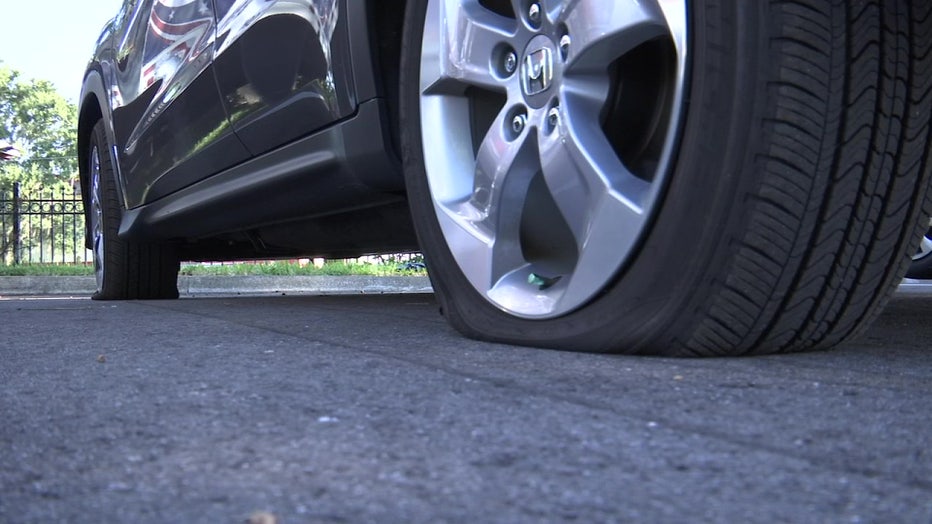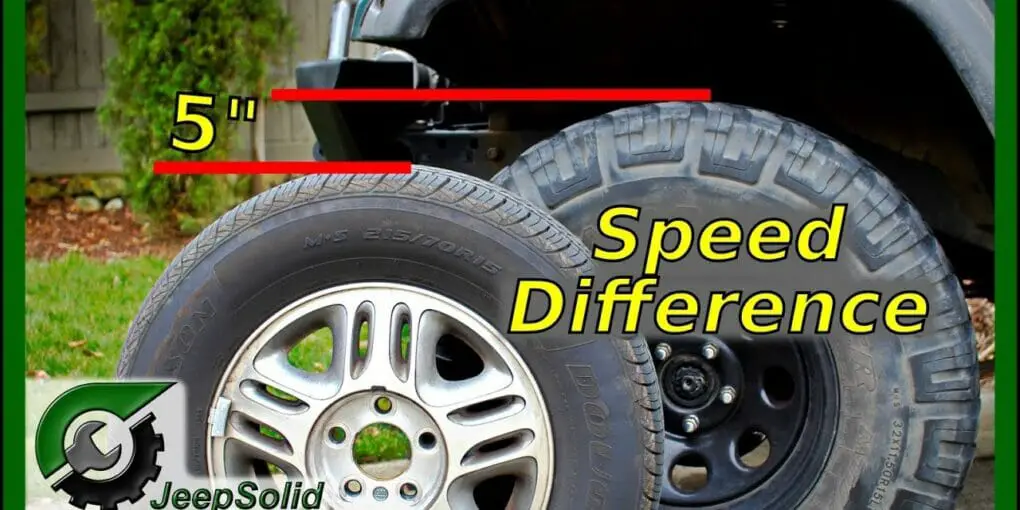How to Calculate Gas Mileage With Bigger Tires
If you have recently installed larger tires on your vehicle, you may be wondering how this will affect your gas mileage. There are a few ways to calculate gas mileage with bigger tires, and the method you choose will likely depend on how accurate you want your results to be. The easiest way to calculate gas mileage with bigger tires is to simply take your old reading and divide it by the new circumference of your tires.
For example, if your old reading was 30 miles per gallon and your new tire circumference is 10% larger, your new gas mileage would be 27 miles per gallon.
- Find the car’s original tires size in the owner’s manual or on the door placard
- Look up the new tire size in a tire size conversion chart
- Convert the new tire size to the equivalent original tire size
- Use a gas mileage calculator to estimate your new gas mileage, using the original and converted tire sizes as inputs

Credit: www.fox13news.com
How Much Does Bigger Tires Affect Gas Mileage?
There are a few things that affect gas mileage, and tire size is one of them. Bigger tires can actually decrease your gas mileage because they have more rolling resistance. That means it takes more energy to keep them moving, which requires more fuel.
If you’re looking to improve your gas mileage, you might want to consider smaller tires.
How Do You Calculate Odometer With Bigger Tires?
Odometer readings are affected when you change the size of your tires. The new tire size will cause the odometer to read less miles than it actually travels. This is because the circumference of the new, larger tires is greater than that of the original tires.
To calculate the effect that a tire size change will have on your odometer reading, you can use a simple formula.First, determine the percentage difference in tire circumference by subtracting the old tire’s circumference from the new tire’s circumference and then divide this number by 2. Next, take this percentage and multiply it by the number of miles indicated on your odometer.
This will give you an accurate measurement of how many miles have been traveled with your new, larger tires.
Does a Taller Tire Give You Better Gas Mileage?
When it comes to gas mileage, there are a lot of variables at play. Tire size is just one of them. So, does a taller tire give you better gas mileage?
It’s actually a bit complicated. A taller tire will have a lower rolling resistance, which could lead to slightly better gas mileage. But, taller tires also tend to be wider, which can cause more drag and lead to worse gas mileage.
In the end, it really depends on the specific tires you’re using. Some tall and wide tires may provide better gas mileage than shorter and narrower ones, while other tall and narrow tires may not fare as well. Ultimately, you’ll need to experiment with different tire sizes to see what works best for your vehicle.
Do Bigger Tires Really Hurt Fuel Mileage?
Tire Size Calculator
There are a lot of variables that go into choosing the right tire size for your vehicle. If you choose the wrong size, it could lead to problems with handling, fuel economy, and even safety.The first thing you need to do is find out the size of the tires that came with your car when it was new.
This information can be found on the door jamb or in the owner’s manual. Once you have that information, you can input it into a tire size calculator like this one from Tire Rack.This calculator will take into account factors like your car’s gear ratio, axle ratio, and transmission type to determine what range of tire sizes will work best for your vehicle.
It’s important to note that there is no single “perfect” tire size – different people will have different preferences based on their driving style and needs.Once you’ve determined what range of sizes will work for your car, it’s time to start shopping around! You can use the same calculator to compare different tire sizes and see how they would affect things like fuel economy and acceleration.
Make sure to do your research and buy from a reputable dealer before making your final decision.
Odometer Difference With Bigger Tires
The average car owner will usually purchase tires that are the same size as the ones that came with the vehicle. However, some people choose to upgrade to larger tires. While this may improve the look of your car, it can also have an effect on your odometer reading.
When you install bigger tires on your car, the circumference of each tire is increased. This means that each revolution of the tire covers more ground than before. As a result, your odometer will register fewer miles than you actually travel.
How much difference does it make? It depends on the size of the tires you install. For example, if you upgrade from 30-inch tires to 35-inch tires, your odometer will under-report your mileage by about 5%.
So, if you drive 100 miles with the new 35-inch tires, your odometer will only show 95 miles traveled.If you’re someone who likes to keep track of their mileage for service intervals or resale value, then this may be something to consider before upgrading to larger tires. Otherwise, it’s really just a matter of personal preference!
Gas Mileage Calculator
If you’re trying to save money on gas, or just be more mindful of your carbon footprint, it’s important to know your car’s gas mileage. Thankfully, there are a number of ways to calculate it.The most accurate way to calculate your car’s gas mileage is by using a fill-up method.
For this method, you’ll need to track the number of miles driven between each fill-up, and the number of gallons used. Once you have that information, simply divide the number of miles driven by the gallons used – this will give you your MPG.There are also a number of online gas mileage calculators that can do the math for you.
All you need is your make and model of vehicle, plus information about your driving habits (like how many miles you drive per week). The calculator will then estimate your MPG based on that data.Of course, every car is different, so your actual gas mileage may vary slightly from what the calculator predicts.
But it’s a good starting point for understanding how fuel-efficient (or not) your car really is.
Lifted Truck Gas Mileage Calculator
If you’re considering lifting your truck, one of the things you might be wondering is how it will affect your gas mileage. Unfortunately, there’s no easy answer, as there are a lot of variables to consider. However, there are some general principles that can help you estimate how much your gas mileage will change after lifting your truck.
One thing to keep in mind is that a taller vehicle will have more wind resistance, which can lead to decreased gas mileage. Additionally, heavier vehicles tend to get lower gas mileage than lighter ones. So, if you lift your truck and add larger tires, it’s likely that your gas mileage will go down.
Of course, every truck is different, so the best way to know for sure how lifting yours will affect your gas mileage is to use a Lifted Truck Gas Mileage Calculator. There are a few different versions of these calculators available online; just enter in some basic information about your truck and the calculator will do the rest.In general, though, if you’re considering lifting your truck, be prepared for slightly lower gas mileage than what you’re used to getting.
But ultimately, the decision is up to you – if you think the benefits of lifted trucks (better off-road performance, increased clearance) outweigh the drawbacks (lower gas mileage), then go for it!
Conclusion
You may have noticed that your car’s gas mileage has decreased since you put bigger tires on it. If you’re wondering how to calculate gas mileage with bigger tires, here’s what you need to know.The first thing to understand is that bigger tires mean more rolling resistance.
This means that your car has to work harder to move the same distance as it did with smaller tires. The good news is that there are ways to offset this decrease in gas mileage.One way is by keeping your tires inflated properly.
This will help reduce the amount of rolling resistance and improve your gas mileage. Another way is to avoid excessive idling and driving at high speeds. Both of these things can cause your car to use more fuel than necessary.
If you’re still not happy with your gas mileage after taking these steps, consider getting a tune-up for your car. This can help improve its fuel efficiency and get you back on track for saving money at the pump!


